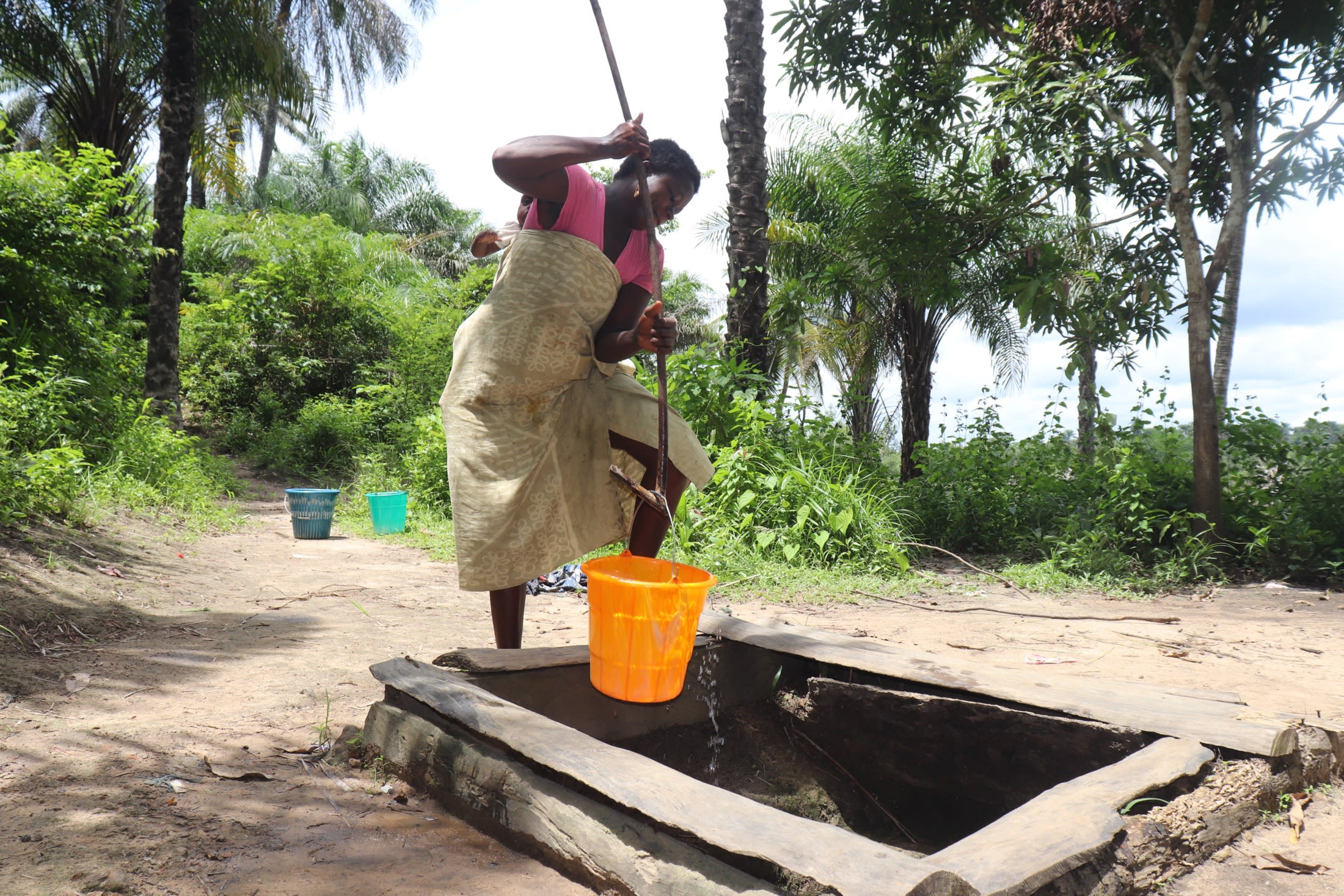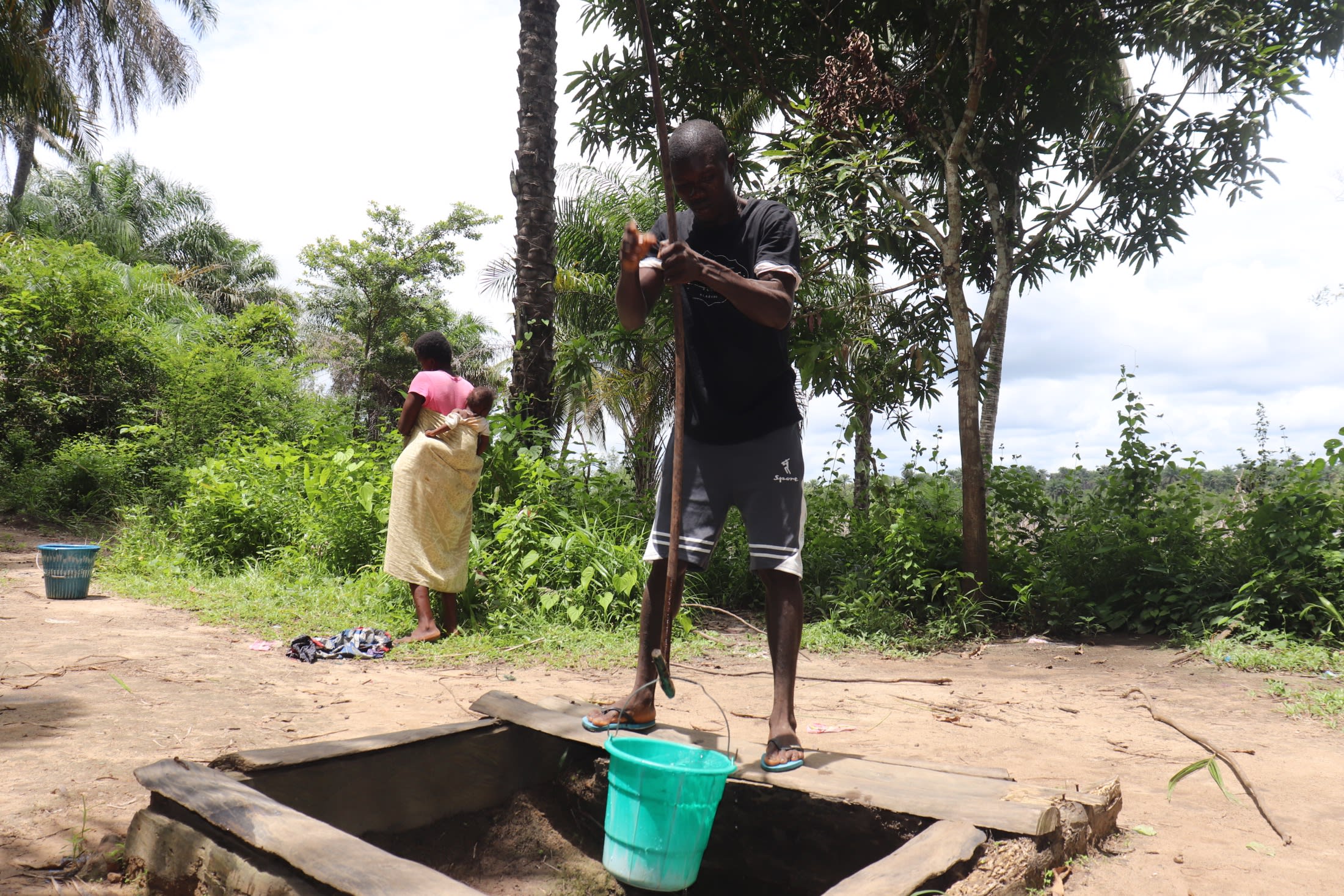October, 2022: Yeamp Mamotta New Borehole Project Complete!
We are excited to share that there is now a safe, reliable borehole well at Yeamp Mamotta Community. As a result, community members no longer rely on unsafe water to meet their daily needs. We also conducted hygiene and sanitation training, which focused on healthy practices such as handwashing and using latrines.
"Today, I am happy because I have a new well in my village," said farmer and village headman Momoh Kamara, to whom we spoke when we first visited Yeamp Mamotta. "I say thanks to God almighty [and] also extend my thanks to [you]."

Momoh, left, kneels with his hands beneath the well's flow.
"I have lived in this village for quite [a] long [time] without getting access to clean water," Momoh continued. "I only [had] swamp water that I managed to drink. This water [was] not safe and clean. You would see snakes in the water, and [that's] the same water I used to drink."

Momoh collects water.
"Now, this water well will help me to complete my tasks that I [did] not complete before, such as [going] to my farm work early. My wife will prepare food on time, and the production of palm oil will be done on time and produce [a] large quantity."
"It was not easy to fetch water from the swamp," said 12-year-old Kadiatu K. "It is far from my house and is a bush road. The water from the swamp is not clean and it sometimes becomes low. I easily [got] tired after I had fetched many trips because of the long distance."

Kadiatu cups her hands beneath the well.
"This new well [is] looking very good, and the water that is coming out from the pump [is] also clean," Kadiatu continued. "It is easy for me to reach the pump because it is very close to my house. I will not have any problems fetching water for my family. Today, I want to say plenty thanks to [everyone] for this new well in my village."

Kadiatu.
"All my problems I used to face in terms of water are over because now I have [a] new well in my village, and this well will help me to complete my tasks that I have never completed before, like [going] to school early, [getting] enough water for my family to cook and drink, launder quickly, and bathe on time," Kadiatu concluded.
We held a dedication ceremony to officially hand over the well to the community members. Several local dignitaries attended the ceremony, including representatives from the Port Loko District Council, the Ward Council, and the Benkia County Community Health Post. Each official gave a short speech thanking everyone who contributed to this water project and reminding community members to take good care of it.

Beatrice dances with the community members.
Beatrice Koroma, from the local community health post, said: "I am happy today because this community [has] access to water, and I hope that these people will take great care of the well. There should be no dirt [in] the surrounding of the well, and I promise to pay regular visits. This well has helped me greatly because I will not be receiving any [more] diarrhea cases. Plenty thanks to [you]. Thanks to the entire staff."
Then, Momoh and Kadiatu made statements on their community's behalf. The ceremony concluded with celebration, singing, and dancing. They sang a song called “Na we yone time." In their local language, Themne, this means: “This is our time.”
New Well
The drill team arrived the day before beginning work. They set up camp and unpacked all their tools and supplies to prepare for drilling the next day. The community provided space for the team to store their belongings and meals for the duration of their stay. The following day, work began.
Our team dug two pits next to the drill rig, one for the drill’s water supply and another for what the drill pulls out of the borehole. In some cases, we order a private supplier to deliver the water for drilling since water access is already challenging.

Day one of drilling began as the team mixed water with bentonite, an absorbent clay, in the two dug pits. Next, the team fixed a four-inch carbide-tipped bit to the five-foot-long drill stem. They started the mud pump to supply water to the drill rig so that drilling could begin!

After putting each five-foot length of drill stem into the hole, the team took material samples. We labeled the bags to review them later and determine the aquifer locations.
On the second day of drilling, the team expanded the hole and cleared it of mud. After reaching a total depth of 18.2 meters, the team forcefully pumped clean water into the well to remove any dirt and debris from the drilling process. We then protected the screened pipe by adding a filter pack. The team hoisted the temporary drilling casing to fortify the pipes with cement.

Yield test.
Next, we bailed the well by hand for three days before conducting a yield test to verify the water quantity. This well has a static water level of 11 meters. With these excellent results, we installed a stainless steel pump. Water quality test results showed that this was clean water fit for drinking!

New Knowledge
Before conducting any hygiene training, we called and visited the local water user committee to understand the community’s challenges and lack of sanitation facilities. We shared the findings from our discussions with the committee members to help them make the necessary adjustments before the training began. For example, we identified households without handwashing stations or ones that may need to repair their latrines. With this information, community members worked together to improve hygiene and sanitation at home.
After this preparatory period, we scheduled a time when members from each household using the water point could attend a three-day hygiene and sanitation training. We then dispatched our teams to the agreed-upon location to hold the meeting. Each household from Yeamp Mamotta sent at least one representative for each of the three days.

Training topics covered included handwashing and tippy taps, good and bad hygiene habits, disease transmission and prevention, COVID-19, worms and parasites, proper dental hygiene, proper care of the well's pump, keeping the water clean, the cost recovery system, the importance of using dish racks and clotheslines, the importance of toilets, keeping latrines clean, balanced diets, the diarrhea doll, and HIV and AIDS.
One of the topics that sparked a lot of interest was the construction of dish racks, which typically serve as both a counter and a drying surface. In the absence of a dish rack, someone who is cooking a meal in Sierra Leone may set their pots on the ground by the fire, where they can be contaminated by domestic and wild animals, insects, and dirt or dust, as one participant, Yebu Kamara, explained.
"One time, I was busy preparing food in the kitchen," she said. "There [was] nobody around to help me. I put the uncooked rice in a bowl, then placed it on the ground. Then, I went into the house to collect salt. When I came outside, I saw the fowls eating the uncooked rice. Unfortunately, the rice [was] all over the ground. I said to myself, what am I going to do now? I have no money on me. What else [will] I and my family eat today? I [had] no choice; I decided to meet the woman who sells foodstuffs to credit me cups of rice, then I [would] pay later."
At the end of the training, all the women promised to construct dishracks at their households, and they were very happy about the good impacts gained during the training. They thanked the team for the new knowledge they received and promised to make changes.

Participants construct tippy-taps.
All of the community members were also intrigued with the concept of a tippy-tap, which utilizes a water container and rope to create a simple handwashing station. We set one up beside the new well, and even before the training the community members were whispering to each other, wanting to know how to make and use one. One of the little boys from the village asked to demonstrate handwashing for the group, which made him smile.

"This training is very much valuable to me because I was lacking in terms of proper hygiene," said 33-year-old teacher Abubakarr Mansary.

Abubakarr after the training.
"I have not been washing my hands with soap and clean water after using the latrine, not even washing fruit before eating it. This new knowledge has impacted my life. All the bad hygiene practices that I have been doing, I will stop them now. With this new knowledge I have received now I know that most of the disease I contracted is [from] not taking care of food, water, and [my] environment. I want to thank [the organization] for saving me and my community people."
Conclusion
This project required a substantial collaboration between our staff, our in-country teams, and the community members themselves. When an issue arises concerning the well, community members are equipped with the necessary skills to rectify the problem and ensure the water point works appropriately. However, if the issue is beyond their capabilities, they can contact their local field officers to assist them.
Also, we will continue to offer them unmatchable support as a part of our monitoring and maintenance program. We walk with each community, problem-solving together when they face challenges with functionality, seasonality, or water quality. Together, all these components help us strive for enduring access to reliable, clean, and safe water for this community.
With your contribution, one more piece has been added to a large puzzle of water projects. In our target areas, we’re working toward complete coverage of reliable, maintained water sources within a 30-minute round trip for each community, household, school, and health center. With this in mind, search through our upcoming projects to see which community you can help next!
Thank you for making all of this possible!




 Borehole Well and Hand Pump
Borehole Well and Hand Pump
 Rehabilitation Project
Rehabilitation Project


































